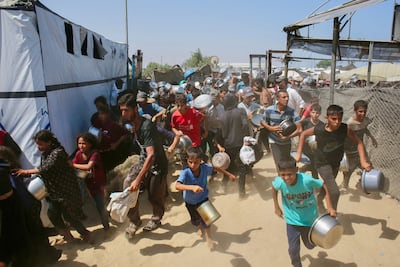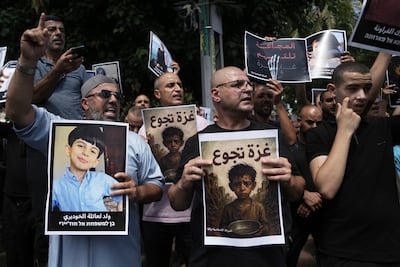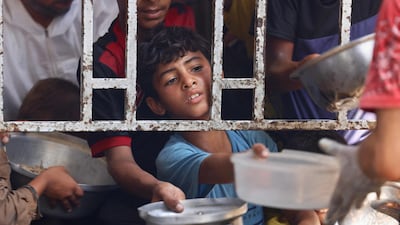In Gaza, where war has choked the economy and blockades have emptied shop shelves, the millennia-old system of bartering is making a comeback.
No longer a relic of ancient times or a plotline in historical dramas, exchanging goods has become a daily necessity for thousands living under Israel's siege. Barter groups, once rare, are now among the most active online communities in Gaza.
“I used to hear about bartering in historical TV series,” Marwan Al Muqayed, 33, a father of two living in temporary accommodation in Gaza city’s Sheikh Radwan neighbourhood, told The National. “But now it’s how I survive. It’s become a way of life.”
With traditional commerce crippled by closed borders, rocketing prices and a severe cash shortage, residents of Gaza are turning to Facebook and WhatsApp groups to exchange goods such as lentils for flour, sugar for rice and soap for shampoo.
Palestinians are living under what UN-backed experts have called a worst-case scenario of famine, with Israel allowing only modest numbers of aid lorries to enter the strip. Dozens of children have died from starvation, according to Gaza health officials, with doctors and aid workers feeling the strain as they try to salvage the situation.
Issa Al Namnam, 44, a father of six, never imagined he would be sourcing baby milk for his youngest child through Facebook. “The war and the lack of cash forced me, like many others, to rely on bartering,” he said. “Sometimes I need oil or sugar but have no money. So I find someone who has what I need and offer them something I have.”
These grass roots exchanges have become lifelines. Mr Al Namnam once swapped flour for a can of baby milk, and traded canned meat for spices he could not find anywhere else.
It’s not an ideal system. “Bartering is old and not very efficient,” he admits. “But in wartime it’s what we have.”
For Mohammad Qusay‘a, 29, bartering is not only practical but the only viable option. A resident of Gaza’s Safatawi neighbourhood, he rarely uses money except for buying a few vegetables. “Most of my needs I cover through exchanges,” he told The National. “I check the WhatsApp group daily, see what people are offering and arrange swaps.”
With cash in short supply and banknotes deteriorating to the point where vendors have stopped accepting them, people were left with little choice. Mr Qusay'a has exchanged items such as dates, sugar, flour, shampoo and soap.
“I got tired of struggling with useless cash,” Mr Qusay‘a said. “Bartering is the only thing that works now. It helps me provide for my family without needing money.”
When Gaza’s border crossings were sealed in March, Mr Al Muqayed had the foresight to stockpile a few staple goods. But as the blockade dragged on, supplies dwindled and prices soared.
“I bought what I could at the start but when things ran out I had to buy from the market and prices were insane,” he says. “That’s when I turned to bartering.”
In one exchange, he traded lentils for pasta and flour. In another, sugar for oil and rice. With Gaza’s economy in freefall and the currency nearly worthless, residents are left clinging to community-driven solutions.
“Prices have doubled, even tripled. People can’t afford anything any more,” he says. “Bartering might not be ideal but it helps us get through this.”
Though most see bartering as a stopgap until the war ends and normal trade resumes, its role in the daily life of Gazans is undeniable. In the face of financial collapse, isolation and hardship, people are building their own alternative economy, one swap at a time.
“For now, bartering is how we survive,” says Mr Al Namnam. “Until the war ends and the shelves are full again, this is the system we trust.”
The President's Cake
Director: Hasan Hadi
Starring: Baneen Ahmad Nayyef, Waheed Thabet Khreibat, Sajad Mohamad Qasem
Rating: 4/5
Who was Alfred Nobel?
The Nobel Prize was created by wealthy Swedish chemist and entrepreneur Alfred Nobel.
- In his will he dictated that the bulk of his estate should be used to fund "prizes to those who, during the preceding year, have conferred the greatest benefit to humankind".
- Nobel is best known as the inventor of dynamite, but also wrote poetry and drama and could speak Russian, French, English and German by the age of 17. The five original prize categories reflect the interests closest to his heart.
- Nobel died in 1896 but it took until 1901, following a legal battle over his will, before the first prizes were awarded.
Most%20polluted%20cities%20in%20the%20Middle%20East
%3Cp%3E1.%20Baghdad%2C%20Iraq%3Cbr%3E2.%20Manama%2C%20Bahrain%3Cbr%3E3.%20Dhahran%2C%20Saudi%20Arabia%3Cbr%3E4.%20Kuwait%20City%2C%20Kuwait%3Cbr%3E5.%20Ras%20Al%20Khaimah%2C%20UAE%3Cbr%3E6.%20Ash%20Shihaniyah%2C%20Qatar%3Cbr%3E7.%20Abu%20Dhabi%2C%20UAE%3Cbr%3E8.%20Cairo%2C%20Egypt%3Cbr%3E9.%20Riyadh%2C%20Saudi%20Arabia%3Cbr%3E10.%20Dubai%2C%20UAE%3C%2Fp%3E%0A%3Cp%3E%3Cem%3ESource%3A%202022%20World%20Air%20Quality%20Report%3C%2Fem%3E%3C%2Fp%3E%0A
MOST%20POLLUTED%20COUNTRIES%20IN%20THE%20WORLD
%3Cp%3E1.%20Chad%3Cbr%3E2.%20Iraq%3Cbr%3E3.%20Pakistan%3Cbr%3E4.%20Bahrain%3Cbr%3E5.%20Bangladesh%3Cbr%3E6.%20Burkina%20Faso%3Cbr%3E7.%20Kuwait%3Cbr%3E8.%20India%3Cbr%3E9.%20Egypt%3Cbr%3E10.%20Tajikistan%3Cbr%3E%3Cbr%3E%3Cem%3ESource%3A%202022%20World%20Air%20Quality%20Report%3C%2Fem%3E%3C%2Fp%3E%0A
Timeline
2012-2015
The company offers payments/bribes to win key contracts in the Middle East
May 2017
The UK SFO officially opens investigation into Petrofac’s use of agents, corruption, and potential bribery to secure contracts
September 2021
Petrofac pleads guilty to seven counts of failing to prevent bribery under the UK Bribery Act
October 2021
Court fines Petrofac £77 million for bribery. Former executive receives a two-year suspended sentence
December 2024
Petrofac enters into comprehensive restructuring to strengthen the financial position of the group
May 2025
The High Court of England and Wales approves the company’s restructuring plan
July 2025
The Court of Appeal issues a judgment challenging parts of the restructuring plan
August 2025
Petrofac issues a business update to execute the restructuring and confirms it will appeal the Court of Appeal decision
October 2025
Petrofac loses a major TenneT offshore wind contract worth €13 billion. Holding company files for administration in the UK. Petrofac delisted from the London Stock Exchange
November 2025
180 Petrofac employees laid off in the UAE
UAE currency: the story behind the money in your pockets
<html><head><meta http-equiv="Content-Type" content="text/html" charset="UTF-8" /></head><body><!--PSTYLE=* Labels%3aFH Label 18 Sport--><p>Beach soccer</p><!--PSTYLE=BY Byline--><p>Amith Passela</p><p /></body></html>
Dates for the diary
To mark Bodytree’s 10th anniversary, the coming season will be filled with celebratory activities:
- September 21 Anyone interested in becoming a certified yoga instructor can sign up for a 250-hour course in Yoga Teacher Training with Jacquelene Sadek. It begins on September 21 and will take place over the course of six weekends.
- October 18 to 21 International yoga instructor, Yogi Nora, will be visiting Bodytree and offering classes.
- October 26 to November 4 International pilates instructor Courtney Miller will be on hand at the studio, offering classes.
- November 9 Bodytree is hosting a party to celebrate turning 10, and everyone is invited. Expect a day full of free classes on the grounds of the studio.
- December 11 Yogeswari, an advanced certified Jivamukti teacher, will be visiting the studio.
- February 2, 2018 Bodytree will host its 4th annual yoga market.
U19 WORLD CUP, WEST INDIES
UAE group fixtures (all in St Kitts)
- Saturday 15 January: UAE beat Canada by 49 runs
- Thursday 20 January: v England
- Saturday 22 January: v Bangladesh
UAE squad:
Alishan Sharafu (captain), Shival Bawa, Jash Giyanani, Sailles
Jaishankar, Nilansh Keswani, Aayan Khan, Punya Mehra, Ali Naseer, Ronak Panoly,
Dhruv Parashar, Vinayak Raghavan, Soorya Sathish, Aryansh Sharma, Adithya
Shetty, Kai Smith
Company%20profile
%3Cp%3E%3Cstrong%3ECompany%20name%3A%20%3C%2Fstrong%3ETwig%20Solutions%20(with%20trade%20name%20Twig)%3Cbr%3E%3Cstrong%3EStarted%3A%20%3C%2Fstrong%3E2021%3Cbr%3E%3Cstrong%3EFounders%3A%20%3C%2Fstrong%3EChafic%20Idriss%2C%20Karam%20El%20Dik%20and%20Rayan%20Antonios%3Cbr%3E%3Cstrong%3EBased%3A%20%3C%2Fstrong%3EUAE%3Cbr%3E%3Cstrong%3ESector%3A%20%3C%2Fstrong%3EFinTech%3Cbr%3E%3Cstrong%3EInitial%20investment%3A%20%3C%2Fstrong%3Ebootstrapped%20(undisclosed)%3Cbr%3E%3Cstrong%3ECurrent%20number%20of%20staff%3A%20%3C%2Fstrong%3E13%3Cbr%3E%3Cstrong%3EInvestment%20stage%3A%20%3C%2Fstrong%3Epre-seed%20%E2%80%94%20closing%20the%20round%20as%20we%20speak%3Cbr%3E%3Cstrong%3EInvestors%3A%3C%2Fstrong%3E%20senior%20executives%20from%20the%20GCC%20financial%20services%20industry%20and%20global%20family%20offices%3Cbr%3E%3Cbr%3E%3C%2Fp%3E%0A
U19 World Cup in South Africa
Group A: India, Japan, New Zealand, Sri Lanka
Group B: Australia, England, Nigeria, West Indies
Group C: Bangladesh, Pakistan, Scotland, Zimbabwe
Group D: Afghanistan, Canada, South Africa, UAE
UAE fixtures
Saturday, January 18, v Canada
Wednesday, January 22, v Afghanistan
Saturday, January 25, v South Africa
UAE squad
Aryan Lakra (captain), Vriitya Aravind, Deshan Chethyia, Mohammed Farazuddin, Jonathan Figy, Osama Hassan, Karthik Meiyappan, Rishabh Mukherjee, Ali Naseer, Wasi Shah, Alishan Sharafu, Sanchit Sharma, Kai Smith, Akasha Tahir, Ansh Tandon
So what is Spicy Chickenjoy?
Just as McDonald’s has the Big Mac, Jollibee has Spicy Chickenjoy – a piece of fried chicken that’s crispy and spicy on the outside and comes with a side of spaghetti, all covered in tomato sauce and topped with sausage slices and ground beef. It sounds like a recipe that a child would come up with, but perhaps that’s the point – a flavourbomb combination of cheap comfort foods. Chickenjoy is Jollibee’s best-selling product in every country in which it has a presence.
Company%20profile
%3Cp%3EName%3A%20Cashew%0D%3Cbr%3EStarted%3A%202020%0D%3Cbr%3EFounders%3A%20Ibtissam%20Ouassif%20and%20Ammar%20Afif%0D%3Cbr%3EBased%3A%20Dubai%2C%20UAE%0D%3Cbr%3EIndustry%3A%20FinTech%0D%3Cbr%3EFunding%20size%3A%20%2410m%0D%3Cbr%3EInvestors%3A%20Mashreq%2C%20others%0D%3C%2Fp%3E%0A





